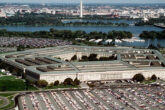March 27, 2018
Send Navy Ships to the Baltic and Black Seas
Basing American vessels there would reassure our allies and restrain Putin
Forward-deployed” American naval forces — those that have home ports outside the United States, such as the forces currently based in Japan and Spain — have provided great strategic value to the United States over the past century. Their positioning far from home waters conveys to potential enemies that we are always present and always “interested” in the geographic regions where those ships sail. It also allows for a smaller overall naval force and reduces the distances involved for logistical-support vessels that normally have to operate far from America’s shores. It’s clear that we are once again immersed in a great-power competition with Russia and China. We should consider whether there are other regions, such as the Baltic and Black Seas, where U.S. Navy forces should be permanently based to provide support to allies and protect U.S. national interests.
The United States Navy has made use of forward-deployed naval forces for more than a century. An Asiatic squadron operated from ports in China and the Philippines during the 19th and early 20th century. After World War II, the Sixth Fleet protected American national interests in the Mediterranean during some of the tensest moments of the long Cold War. The Vietnam War was fought by ships operating from the deep-water port at Subic Bay, in the Philippines. Today, Navy ships take up station from bases in Japan and Spain. These bases provided strategic, fiscal, and logistics advantage.
Read the full op-ed on the National Review.
More from CNAS
-
The Department of Defense’s Breakthrough Nuclear Moment Risks Slipping Away
Unless they act, the Department of Defense’s breakthrough nuclear moment may vanish before it really happens....
By Will Rogers
-
DEFAERO Strategy Series [Apr 09, 25] CNAS' Becca Wasser and Phil Sheers on Revitalizing the U.S. Defense Industrial Base
On this episode of the Defense & Aerospace Report Strategy Series, sponsored by General Atomics Aeronautical Systems, Becca Wasser and Phil Sheers of the Center for a New Amer...
By Becca Wasser & Philip Sheers
-
From Production Lines to Front Lines
Executive Summary The U.S. defense industrial base (DIB) is struggling to meet the demands of the current strategic environment—let alone prepare for a potential conflict agai...
By Becca Wasser & Philip Sheers
-
The Pentagon’s Endangered Brain Trust
In this environment, sound assessments of emerging threats and new ideas to counter them will be especially vital....
By Dr. Andrew Krepinevich, Jr.




